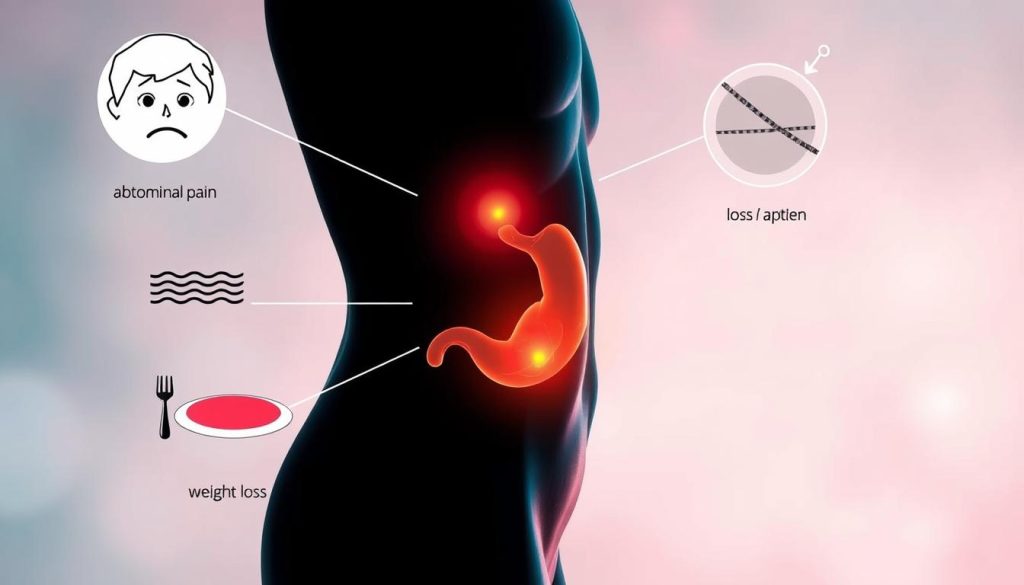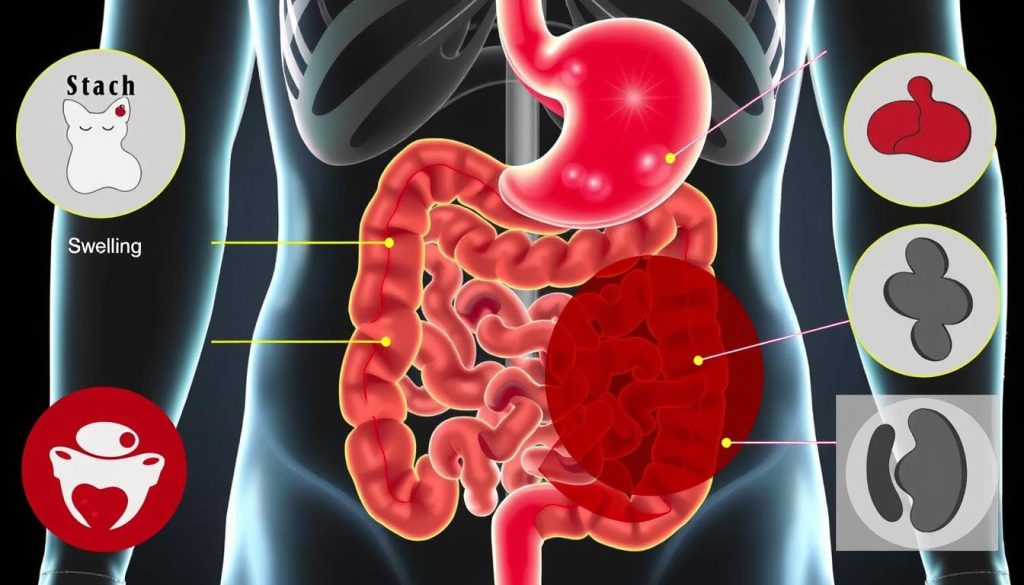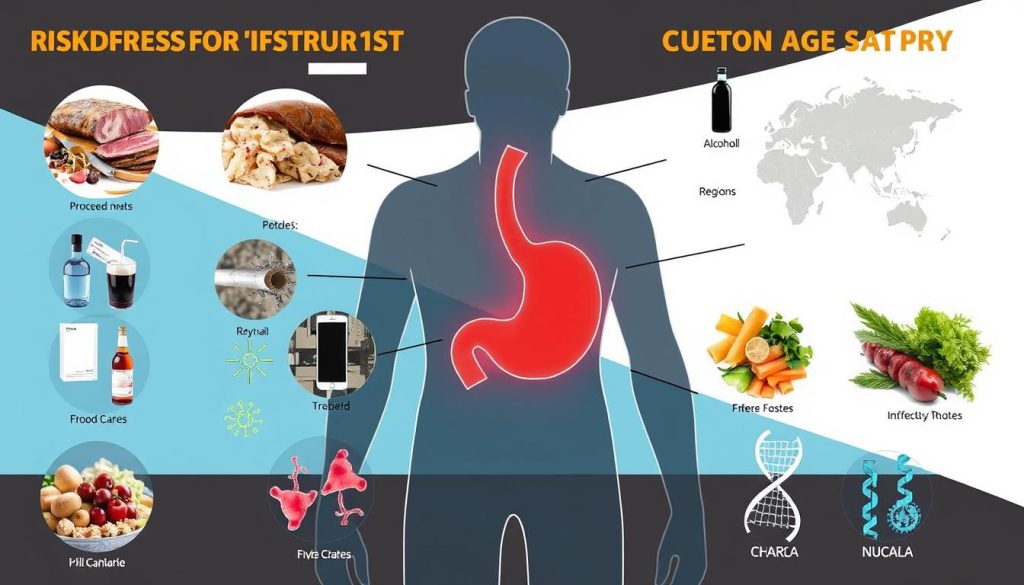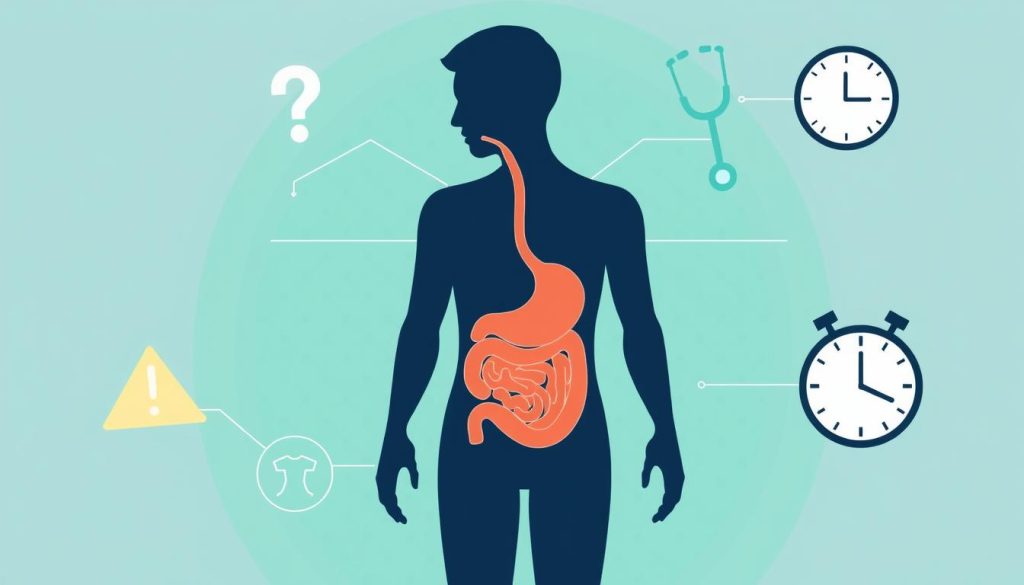Knowing the signs of stomach cancer is key for early treatment. Stomach cancer, or gastric cancer, grows slowly. It’s important to spot the early signs to get medical help on time. The symptoms of stomach cancer can be hard to notice at first. You might feel persistent indigestion, lose weight without trying, or have changes in how hungry you feel. If these symptoms last, see your doctor at healthwith.com.
As stomach cancer gets worse, you might feel more pain in your belly. You could also have trouble swallowing or see blood in your stool. Paying attention to these signs can help you stay healthy.
Understanding Stomach Cancer: Essential Facts and Statistics
Stomach cancer is a serious disease that affects the digestive system. It’s important to watch for signs of stomach tumors. This disease happens when stomach cells grow in an abnormal way, forming tumors that can spread.
What Is Stomach Cancer and How It Develops
Stomach cancer usually starts in the mucosa, the stomach’s innermost layer. It grows slowly, often without early symptoms. Knowing the signs of gastric carcinoma is key for catching it early.
Current Statistics and Risk Factors
Recent data shows that stomach cancer rates are dropping in the U.S. Risk factors include:
- Diet high in salty and smoked foods
- Smoking
- Family history of stomach cancer
- Certain medical conditions, like H. pylori infection
Demographics Most Affected by Gastric Cancer
Some groups are more likely to get stomach cancer. Knowing who’s at risk helps in spotting it early.
| Demographic Factor | Risk Level |
|---|---|
| Age | Higher risk after 50 |
| Gender | Men at higher risk |
| Ethnicity | Higher in Asian, Hispanic, and African American populations |
Knowing the signs of stomach tumors and who’s at risk can help catch it early. Always see a doctor if you have ongoing digestive problems or other symptoms.
Common Signs of Stomach Cancer
Spotting stomach cancer early is key to better treatment. Some symptoms might seem minor at first but are important. Let’s look at the common signs that could mean stomach cancer.

Abdominal pain and weight loss are common signs. The pain might start as a dull ache and get worse. Losing weight without trying, even when eating well, is a warning sign. Some people feel full fast or lose their appetite.
Other signs to watch for include:
- Persistent nausea or vomiting
- Difficulty swallowing
- Bloating after meals
- Blood in stool or vomit
- Heartburn or indigestion that doesn’t go away
Remember, these symptoms can also mean other health issues. If you keep feeling pain in your stomach and losing weight, or any of these signs, see a doctor right away. Catching stomach cancer early can greatly improve treatment results.
Early Warning Signs That Shouldn’t Be Ignored
Spotting gastric cancer signs early can greatly help treatment. The first signs often come from small changes in your body. Look out for these important signs:
Persistent Indigestion and Heartburn
Heartburn or indigestion that doesn’t go away with common meds is a warning. If you feel a burning in your chest or upper stomach for a long time, see a doctor.
Changes in Appetite and Eating Habits
Feeling very hungry or full quickly can mean stomach trouble. These signs might be your body telling you something’s wrong.
Unexplained Weight Fluctuations
Big weight loss or gain without trying could be a sign of stomach cancer. Keep an eye on any unusual weight changes and talk to your doctor.
| Warning Sign | Possible Indication | Action |
|---|---|---|
| Persistent Indigestion | Stomach lining irritation | Consult doctor if lasting over 2 weeks |
| Appetite Changes | Tumor affecting stomach capacity | Monitor food intake, seek medical advice |
| Weight Fluctuations | Metabolic changes due to cancer | Track weight, discuss with healthcare provider |
These symptoms don’t always mean cancer, but they need attention. Catching stomach cancer early starts with being aware and acting fast when you notice changes.
Digestive System Changes as Warning Signals
Spotting stomach cancer symptoms early can be tough. They often look like usual digestive problems. Look out for small changes in how your body works.

Feeling bloated after meals, even with small food, might signal a problem. If you often feel sick or throw up after eating, it’s something to think about. These signs can start small but get worse.
Having trouble swallowing, or dysphagia, is another warning sign. It feels like food is stuck in your throat or chest. This can cause you to lose weight without trying, a common symptom of stomach cancer.
| Digestive Change | Possible Indication |
|---|---|
| Persistent Bloating | Tumor growth affecting stomach capacity |
| Frequent Nausea/Vomiting | Obstruction in the digestive tract |
| Difficulty Swallowing | Tumor near the esophagus or upper stomach |
| Unintentional Weight Loss | Reduced food intake or malabsorption |
Changes in how you go to the bathroom, like constipation or diarrhea lasting weeks, can be signs. Seeing blood in your stool or it looks darker than usual is a red flag. These could mean there’s bleeding in your digestive tract, a sign of stomach cancer.
Advanced Symptoms of Gastric Cancer
As stomach cancer gets worse, its signs become clearer. It’s important to know these signs to get help early. Let’s look at the severe symptoms that show the disease is getting worse.
Severe Abdominal Pain Patterns
Intense, ongoing pain in the belly is a sign of advanced stomach cancer. This pain gets worse after eating or when you lie down. Some people say it feels like a burning or a deep ache in the upper belly.
Blood in Stool or Vomit
Blood in your stool or vomit is a serious warning sign. It might look like dark, tarry stools or coffee-ground vomit. If you see this, get medical help right away.
Chronic Fatigue and Weakness
Feeling very tired and weak is common in advanced stomach cancer. This tiredness doesn’t go away with rest. It might also make your skin look pale because of anemia from bleeding inside.
| Advanced Symptom | Description | Action Required |
|---|---|---|
| Severe Abdominal Pain | Intense, persistent pain in upper abdomen | Consult doctor immediately |
| Blood in Stool/Vomit | Dark, tarry stools or coffee-ground vomit | Seek emergency medical care |
| Chronic Fatigue | Persistent exhaustion, pale skin | Schedule a thorough check-up |
Knowing these signs of advanced stomach cancer can help find and treat it sooner. If you have any of these symptoms, see a doctor without delay.
Risk Factors Contributing to Stomach Cancer Development
Knowing the risk factors for stomach cancer is key to catching it early. Some risks we can’t change, but others we can manage. Spotting these risks helps us find signs of stomach cancer early.

Age and gender are big factors in stomach cancer risk. Men over 50 are more at risk. If your family has had stomach cancer, you’re more likely to get it too.
What you eat and how you live can also affect your risk. Eating too much of smoked, salted, or pickled foods can harm your stomach. Smoking and drinking a lot of alcohol also raise your risk. Eating well, staying active, and keeping a healthy weight can lower your risk.
| Risk Factor | Impact Level | Controllable? |
|---|---|---|
| Age (over 50) | High | No |
| Male Gender | Moderate | No |
| Family History | High | No |
| Diet (high in preserved foods) | Moderate | Yes |
| Smoking | High | Yes |
| Alcohol Consumption | Moderate | Yes |
| Obesity | Moderate | Yes |
Some health issues can up your risk for stomach cancer. These include long-term stomach inflammation, pernicious anemia, and past stomach surgery. H. pylori infection, a common stomach bug, is a big risk factor. It can be treated with antibiotics.
Diagnostic Procedures for Stomach Cancer Detection
Early detection of stomach cancer is key to successful treatment. Doctors use different methods to find signs of stomach cancer. Let’s look at how they diagnose this condition.
Initial Screening Methods
The first step is a physical exam and blood tests. Your doctor might check for swollen lymph nodes or masses in your abdomen. Blood tests can show signs like anemia that might point to stomach cancer.
Advanced Imaging Techniques
If the first tests show concerns, advanced imaging is used. These methods give detailed views of the stomach and nearby areas.
| Imaging Method | Purpose |
|---|---|
| Upper Endoscopy | Examines the esophagus, stomach, and small intestine |
| CT Scan | Creates cross-sectional images of the body |
| PET Scan | Detects cancer cells throughout the body |
Biopsy Procedures and Analysis
A biopsy is the best way to confirm stomach cancer. Doctors remove a small tissue sample for lab tests. The results show if there are cancer cells and what they look like.
These tests work together to accurately find stomach cancer. Finding cancer early can greatly improve treatment results and the patient’s outlook.
When to Seek Medical Attention
Spotting gastric cancer signs early is key to saving lives. If you keep feeling pain in your belly and losing weight, see a doctor fast. These signs together might mean something serious.

- Unexplained weight loss of 10 pounds or more
- Severe or constant abdominal pain
- Difficulty swallowing or feeling full quickly
- Persistent nausea or vomiting
- Blood in stool or vomit
If you have these symptoms for over two weeks, make a doctor’s appointment. Catching stomach cancer early can greatly improve your chances of recovery.
It’s important to go for regular health checks, too. This is true if you have a family history of gastric cancer, smoke, or eat a lot of processed foods. Don’t hesitate to get checked out. If something doesn’t feel right, it’s better to be safe than sorry.
Abdominal pain and weight loss can mean different things, not just stomach cancer. A doctor can run tests to find out what’s wrong and help you. Your health is important, and it’s worth the time to get checked.
Lifestyle Factors Affecting Stomach Cancer Risk
Knowing what lifestyle choices can affect stomach cancer risk is important. Some symptoms may not show up right away. But, certain habits can raise your risk of getting this disease.
Dietary Influences
Your diet is key to your stomach health. Eating a lot of smoked and salted foods can up your risk. But, eating more fruits, veggies, and whole grains can help protect you.
Smoking and Alcohol Impact
Smoking and drinking too much alcohol are big risks for stomach cancer. Quitting smoking and drinking less can lower your risk. It can also help with other health issues.
Physical Activity Considerations
Being active can help lower stomach cancer risk. Try to do at least 150 minutes of moderate exercise or 75 minutes of vigorous exercise a week. Activities like brisk walking, swimming, or cycling are good.
| Lifestyle Factor | Impact on Stomach Cancer Risk |
|---|---|
| High-salt diet | Increases risk |
| Fruit and vegetable intake | Decreases risk |
| Smoking | Significantly increases risk |
| Regular exercise | May decrease risk |
By choosing healthy lifestyle habits, you can lower your risk of stomach cancer. Remember, catching stomach cancer early is key to treating it well.
Prevention Strategies and Recommendations
By taking proactive steps, you can lower your risk of stomach cancer. Focus on lifestyle changes and regular health check-ups. This way, you can protect your health and catch stomach cancer early.

Eating a balanced diet is key. Include lots of fruits, vegetables, and whole grains. These foods are full of nutrients and antioxidants that help protect your stomach. Try to avoid processed meats and foods with a lot of salt, as they can increase your risk of gastric cancer.
Regular exercise is also important. It helps keep you at a healthy weight and boosts your immune system. Try to do at least 150 minutes of moderate activity or 75 minutes of vigorous activity each week.
Quitting smoking and drinking less alcohol are also essential. Both habits can raise your risk of getting stomach cancer.
Early detection of stomach cancer is critical for successful treatment. Watch out for ongoing digestive problems. Make sure to see your doctor regularly, even more so if you have a family history of gastric cancer.
| Prevention Strategy | Benefits |
|---|---|
| Balanced diet | Provides protective nutrients |
| Regular exercise | Boosts immune system |
| Avoid smoking | Reduces cancer risk |
| Limit alcohol | Protects stomach lining |
| Regular check-ups | Enables early detection |
By following these steps, you’re taking big steps to prevent stomach cancer. You’re also improving your overall digestive health.
Treatment Options for Stomach Cancer
When stomach tumor indicators or symptoms of stomach malignancy are confirmed, various treatment options become available. The choice depends on the cancer stage, patient health, and other factors.
Surgery and Recovery
Surgery is often the primary treatment for stomach cancer. It involves removing the tumor and surrounding tissue. Recovery can take several weeks, requiring dietary adjustments and pain management.
Chemotherapy Protocols
Chemotherapy uses drugs to kill cancer cells. It’s given in cycles, with rest periods between treatments. Side effects may include nausea, hair loss, and fatigue. Doctors monitor patients closely during chemotherapy.
Targeted Therapies
These treatments focus on specific changes in cancer cells. They can be more effective and have fewer side effects than traditional chemotherapy. Targeted therapies are often used for advanced stomach cancer.
| Treatment | Purpose | Duration | Common Side Effects |
|---|---|---|---|
| Surgery | Remove tumor | 4-6 hours | Pain, infection risk |
| Chemotherapy | Kill cancer cells | 3-6 months | Nausea, fatigue |
| Targeted Therapy | Attack specific cancer traits | Ongoing | Skin rash, diarrhea |
Your doctor will create a personalized treatment plan based on your specific stomach tumor indicators and symptoms of stomach malignancy. Regular follow-ups and adjustments to the treatment plan are key for the best results.
Living with Stomach Cancer: Daily Management
Living with stomach cancer is tough every day. Patients deal with eating problems, pain, and emotional stress. Finding ways to handle these issues is vital for a good life.
Eating right is key when you have stomach cancer. Some people lose their appetite or find it hard to eat. Eating small meals often and choosing soft foods can help. Getting advice from a dietitian is also a good idea.
Managing pain is another big challenge. There are many ways to ease pain, like medicine, relaxation, and gentle exercise. It’s important to talk to your doctor about your pain to find the best solution.
Don’t forget about your mental health. Cancer can really affect your mood. Joining support groups, talking to a counselor, and practicing mindfulness can help. Keeping in touch with friends and family is also important for staying positive.
| Daily Management Strategies | Benefits |
|---|---|
| Small, frequent meals | Easier digestion, better nutrient intake |
| Pain management techniques | Improved comfort, better quality of life |
| Emotional support | Reduced stress, improved mental health |
| Regular exercise | Increased energy, better overall health |
While managing daily life with stomach cancer, it’s important to stay vigilant about gastric carcinoma red flags. Knowing the signs of stomach cancer can help in early treatment. Regular check-ups and talking openly with your healthcare team are key for good management.
Support Resources and Patient Care Networks
Facing stomach cancer can feel overwhelming, but you’re not alone. Many support resources are available to help patients and their families. These networks offer emotional support, financial aid, and educational materials.
Support Groups and Communities
Connecting with others who get what you’re going through can be very comforting. The Stomach Cancer Foundation has online forums and local meetups. Here, patients can share their stories, tips, and find emotional support.
Financial Assistance Programs
The cost of cancer treatment can be a big worry. Luckily, there are programs to help with this. The Cancer Financial Assistance Coalition offers help with medical bills, transportation, and daily living costs.
Educational Resources
Knowing about stomach cancer is key to managing it. The American Cancer Society has guides on warning signs, treatment, and lifestyle changes. These resources help patients and caregivers make informed choices and understand what to expect.
FAQ
Q: What are the most common early signs of stomach cancer?
A: Early signs of stomach cancer include persistent indigestion and unexplained weight loss. You might also feel abdominal pain or discomfort. Changes in appetite and feeling full after eating small amounts are other signs.
It’s important to remember that these symptoms can have other causes. But if they last, seeing a doctor is key.
Q: Who is at higher risk for developing stomach cancer?
A: Several factors increase stomach cancer risk. Being over 50 and male are two. A family history of stomach cancer also raises risk.
Smoking and drinking too much alcohol are harmful. Eating a lot of smoked and salted foods is also risky. H. pylori infection and certain medical conditions like chronic gastritis can also increase risk.
Q: How is stomach cancer diagnosed?
A: Diagnosing stomach cancer involves several steps. First, doctors might do blood tests and physical exams. Then, they use endoscopy, CT scans, or PET scans to see the stomach.
The final step is a biopsy. This is when a doctor takes a small tissue sample to check for cancer cells.
Q: Can stomach cancer be prevented?
A: While prevention isn’t always possible, some lifestyle changes can help. Eating a healthy diet and avoiding processed foods are good. Not smoking and drinking in moderation are also important.
Staying active and treating H. pylori infections early can also help prevent stomach cancer.
Q: What are the treatment options for stomach cancer?
A: Treatment for stomach cancer depends on the disease’s stage and the patient’s health. Surgery to remove the tumor is common. Chemotherapy and radiation therapy are also used.
In some cases, targeted therapies are used. Each treatment plan is made just for the patient.
Q: How does stomach cancer affect daily life?
A: Stomach cancer can change daily life a lot. Patients might have to adjust their eating habits and manage pain. Treatment side effects and emotional challenges are also common.
But, with the right care and support, many patients can live well. Nutritional counseling, pain management, and emotional support are key.
Q: Are there support resources available for stomach cancer patients?
A: Yes, there are many resources for stomach cancer patients and their families. Support groups, both in-person and online, offer a place to connect with others. Many organizations also provide financial help for treatment costs.
There are also lots of educational resources to help patients and caregivers understand and manage the disease.

















